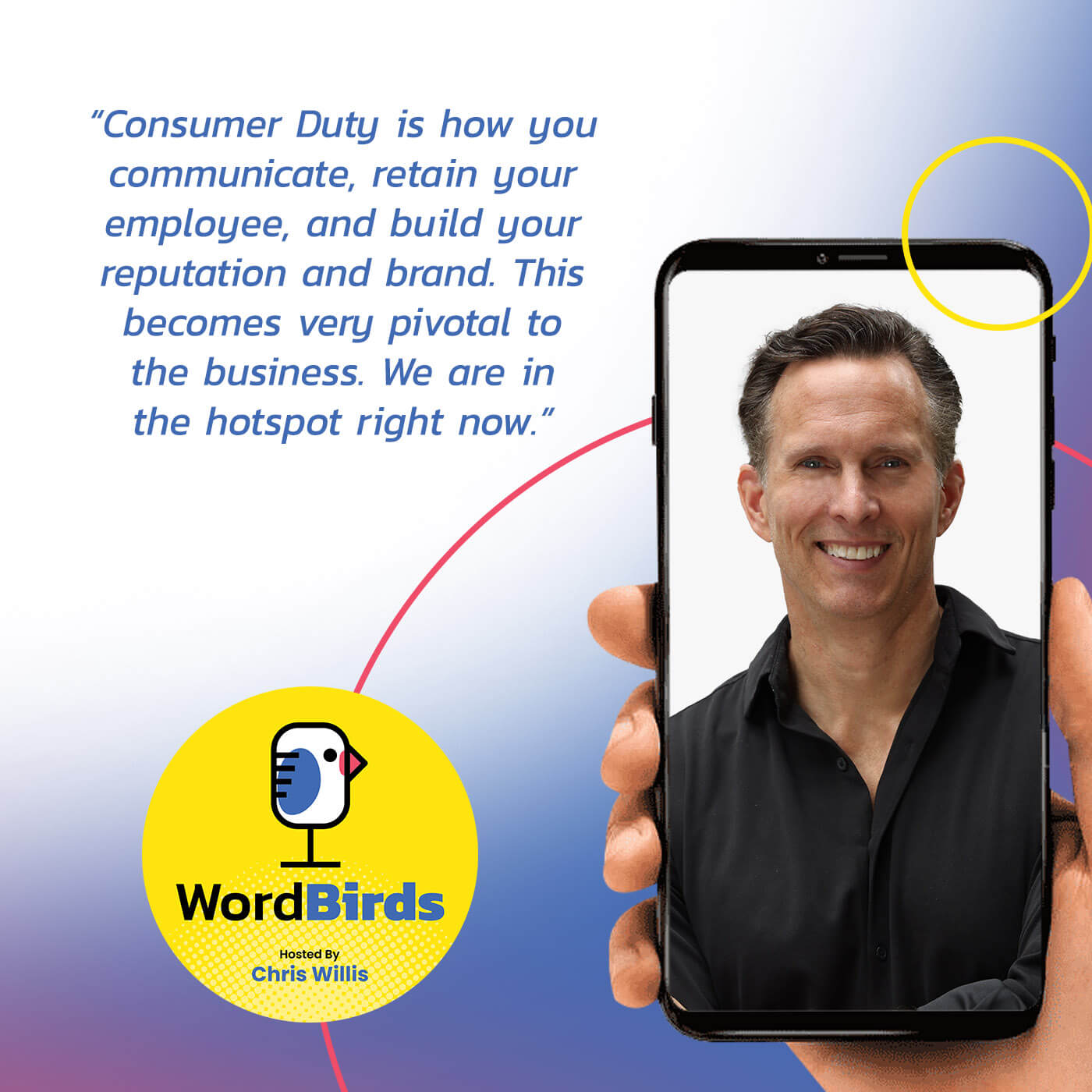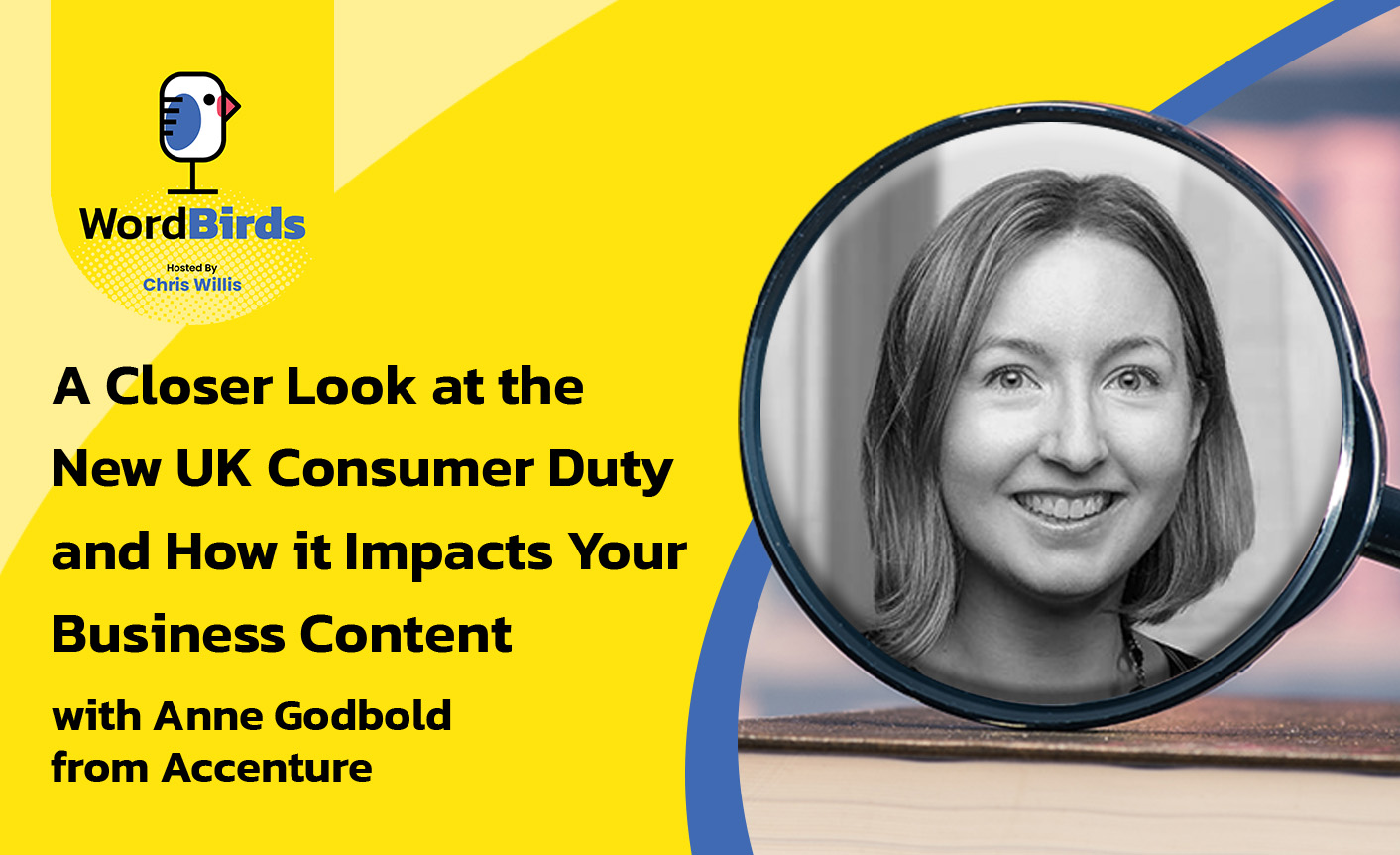The UK’s Financial Conduct Authority has crafted a brand new regulation called Consumer Duty. This aims to improve communications among financial services companies to address banking scandals and irregularities in recent years.
Chris Willis sits down with Anne Godbold, a non-financial risk specialist at Accenture, to discuss how this regulation will change the entire marketplace. She explains how businesses can and must adhere to Consumer Duty while providing better services to clients and achieving higher employee retention.
Anne also discusses how other countries can adopt this regulation and the dangers of running a company that leverages lack of clarity.
Watch the episode here
Listen to the podcast here
Read full episode transcript
In this episode, we’ll be talking about consumer duty, a regulation designed to improve communication at financial services companies in the United Kingdom. We’re going to be talking to Anne Godbold. Anne is a non-financial risk specialist at Accenture in the UK. We’re going to talk about what the regulation means, its impact on business, and the opportunities it creates in the marketplace. Let’s sit back and get some insight from the flock.
Anne, welcome to the show.
Thank you very much. I appreciate it.
I’m excited about our topic because I think our topic is very important to the audience of our show, specifically the folks that are based in the UK. In this episode, we’re going to be talking about consumer duty and the impact that it’s having on content creation inside financial services specifically in the UK. You are a specialist in this space, a non-financial risk specialist at Accenture. You are fairly knowledgeable here, I believe. A great place to step off would be top-level, what are we talking about here? What is consumer duty?
In the UK, our regulators have come forward with a new regulation that’s focused on outcomes. In the last few years, we’ve seen a number of banking scandals, of headlines that are not that we would like them to be, things that have gone wrong. With the new CEO in place at the Financial Conduct Authority, the UK regulator, they’ve come out with a new regulation and a set of outcomes to push forward the next generation of conduct regulation.
It’s quite difficult for firms, this one. It’s making them think through, how do you make sure that you are achieving these right outcomes in everything that you do? They’ve been guided that products and services must be designed and sold according to the needs of their customers. Price and value must represent fair value for consumers. The consumers must be supported and ensure their needs are met, and that all communications with them are in their interests. The key for this conversation is the customers understand and are able to make informed decisions.
From a regulation standpoint, that’s a great overview of what it is, but if I’m sitting at a desk at an impacted company, what does that mean to me? How does this impact me in my day-to-day job trying to adhere to the regulation?
Since the financial crisis, we formed a lot work to make sure we are selling in the right way, but we haven’t necessarily done so much work to think about how do we make sure the customer is supported in getting good outcomes throughout the life cycle. The reality is that customers’ needs might change and the world might change. The world we’re in now, where in the UK, inflation is at 9.9%. People haven’t seen a rise in real income in the last few months.
You’re seeing a lot of volatility in the markets. It’s important to make sure we’re continuing to look after those customers, and make sure they are being supported throughout. What it means if you are sitting at your desk and you are working in this communication space is that you need to be able to think about what do you communicate, when do you communicate, what are the trigger points to make sure that customer is still being supported and still understands what’s going on and is able to make good decisions throughout that life cycle.
You need to communicate the trigger points with your customers clearly. They must know that they are properly supported and can make good decisions.CLICK TO TWEET
You need to think about making sure that it’s clear and is suitable for the customer that you are reporting to. That’s important because the FCA says that only 1 in 7 adults have a literacy skill that would be expected of a child aged eleven or below. That’s a massive amount of people that might struggle to read some of the materials that have been drafted.
You’ve got to make sure that you are drafting all communications that’s suitable for that audience. Reflect the expected level of understanding they would have to get good outcomes, and that you are making sure that you have got an evidence trail of why you thought it was suitable, how it’s helping get the right outcomes, and the appropriate trail of governance to make sure you can show that it was approved.
We have a line that we say quite often which is, “If you didn’t have evidence that happened, it didn’t happen.” This is a real change that’s come with consumer duty. Making sure that responsibility sits with senior colleagues in the bank to be able to demonstrate what is happening within their firm across the product life cycle is supporting customers to get these good outcomes. There are extra requirements around evidence in what you are doing.
They dropped this regulation. It sounds like a great idea. How are businesses supposed to do this? These best practices for content governance creation internally still wouldn’t meet the level of rigor that this seems to have. What was the thought at the onset of how a company would adhere to this?

The one thing our UK regulator very rarely does tell you is how to do it. It likes the idea that the firms have to think it through themselves because that helps them own it. It helps them design it for their reality. Reflecting the fact that some of these firms will be massive and some will be quite small. Some will have a very focused customer group. Some might have quite different customer needs, but there is an awareness that there is some work required here.
Firms at the moment are going through a planning phase. End of October, they have to set their implementation plans to the regulator for review. There is an expectation that they would’ve considered how do they uplift their process to make sure that communications that they’re issuing going forwards have been approved, and are considering things such as economic variables, the product life cycle, how things can change and the customer. Thinking about using the data from the customer to make sure they’re identifying those moments that matter.
Those trigger points to help get ahead matters in that type situation where you might be able to have an impact on the person by educating them up front when you see those indicators that they’re falling into where it is, for example. The other thing they’re expecting are all communications are live, so messages on your internet, the customer-facing, the letters that you are issuing, the booklets that perhaps go when someone buys a product.
Any messages that your branch staff are handing out like literature, all of that will be reviewed for products that are live that they can take out now. Make sure that the right information is going to the right customer at the right time in a way that they can understand so they are making informed decisions.
To be fair, it sounds very complicated to think through this process from scratch. I assume that means they must have given these companies years to figure out this process. Gauging by your face, that’s not true.
The process component of this probably isn’t that complicated. I think we’re probably all quite confident about how we write stuff. I think the doing of this is the most difficult bit because there’s a volume of communications out there. What we are seeing with our firms now in the UK are that they are saying, “We know what good looks like, we defined that. We’re okay that we know what this process should look like, but it’s a lot of work to get all of those communications that are live and reviewed, and certainly are meeting these standards. We are comfortable that the quality of information and how it is presented will deliver to the standards that we are now setting for ourselves.
When we talk about proving effort to meet the requirement, what is the thing that you are saying that companies should be doing to show that proof? How do you prove that you’re doing this?
This is where having tooling supports, and making sure that you’ve got tooling that supports you in a workflow to have that confidence that the processes that you are defining are there. That they are helping your colleagues have a good experience. This isn’t becoming overly difficult keeping notes of the spreadsheet that you are recording that governance trail so that you can pick it up whenever you need. That makes sense because we don’t yet know how the regulator is going to review this. Whether it’ll be within that supervisory visits, asking for ad hoc information. You do need to make sure you’ve got a way that you can record an evidence.
One of the most difficult components though is when we talk about trigger points about making sure when customers taking out a product, they remain suitable for them. You’re getting that information they might need when something has changed for them. It’s here where it gets a little bit more complicated because you may need to think about how you’re getting the data, what data you need, how you are able to use it so you are sending those communications out at the right time. Making sure those communications are tailored for that person and their needs. That is what is particularly difficult our firms are working through and struggling with now.
The implementation date for this isn’t too far off. They needed to hit a deadline in 2023 July. For things like some of the tooling and some of these longer-term data solutions, it might be difficult to get that in place by then. It could be their tactical solutions short-term before they can implement these longer term more strategic data-led components.
I think we didn’t mention the date until now, but it is a July timeframe of 2023 to meet this requirement in some material way. It sounds like a lot of work. Is there opportunity that comes out of this for the companies? Does this create any additional benefit for them or is this just a consumer benefit?
A consumer benefit is brilliant. We know, and the data says the way you can get the right communications in place, the things like debt collection, you can help prevent a situation becoming very difficult. You can help them much earlier. You could have a much better outcome for the person and from a collection perspective from the bank. More widely, we all think that the more customer-centric you can be, the more loyal your customers will be with you. The more willing they will be to trust you and tell you what’s going on. They give you the information to help you. The more products potentially they’ll be able to use if they understand why they benefit them. Achieving customer interest may well be a differentiator. We saw that with our neobanks when they came in. Maybe this is a time for everyone to make sure they are doing what they want to be doing and getting it right for the customers and building that loyalty.

Aside from being a technical challenge, a business process challenge, the idea behind it seems very simple. It should be easier to understand for our consumers. Do you see this moving beyond the UK as you move forward? What’s your stance on that?
As a Brit, we like to think that we show the rest of the world the way to go, maybe only in regulation terms. We have done that for the last few years. We were one of the first jurisdictions to come in with conduct regulation. We saw that was followed by the US, Hong Kong, Australia, and many other jurisdictions. This is the next generation in conduct regulation. My expectation is if this is successful and the world is watching, those other countries will pick this up as they have picked up many of our regulated requirements before.
This reflects something that customers need. They want that help to understand what’s going on. We’re living in a market now that is very difficult for many people. We’re talking about mortgage arrears. In the UK, we’ve got predictions of how many people’s fixed interest mortgage comes up. They’re going to need a little support with the mortgage rates boom. They’re predicted to hit 7%-8% in 2023. The idea that you can help communicate and get impact and help those people get the right outcomes is beneficial. I can’t see why other people aren’t going to pick that up and make sure that their country, their customers are protected in the same way.
Especially as products, financial products become more complex and people get more programmed to click through. You don’t pay much attention anymore to what you’re signing because you don’t understand it. We’ve gone through several remortgaging processes in the last couple of years. I know from personal experience, I gloss over. I’m like, “Flip the page, tell me where to sign,” because most of it, I don’t understand what it means anyway, so I’m going to move through it.
If you made the content more consumable, better decisions could be made. A remortgage probably is the best example because it is what it is. When you go into buying your first car and you don’t know that you’re signing an 18% interest rate loan, and that’s very specific. It is the story of me buying my first car. Now I’m paying for a broken-down Ford Explorer for the rest of my life at a very high rate because it wasn’t immediately clear to me. It’s not written in humans.
That, as a point of this whole process, is a regulation that should be considered well beyond the region where it is currently being considered because people don’t know what they’re signing. People don’t know what the business means. I was on a call with a friend talking about changing banks. It sounds like I’m making up a story for a conversation, but this really happened. She said, “They’re offering me $400 to change banks.” “Do you know why?” “No. What do you mean?” “Did you read through to understand what the fee structure is because they’re going to get their $400 back? They’re not just giving you money. There’s a way.” The answer was, “No, I don’t understand those things.” I see the definite importance to this and the opportunity that it makes for good businesses. Does this suppose issues for some investment companies that very specifically want to be unclear? There are businesses out there that are leveraging a lack of clarity.
I love what you’ve mentioned because what you mentioned is very human. It’s a behavior bias, but it’s an information bias, so we don’t understand it. Whether it’s a nudge in the wrong way, are you using behavioral psychology to make you do something that could be good or could not be, or our UK regulated was causing sludges, which are friction points added that stop you from doing what you want to do, such as leaving a bad product.
The idea that is to get rid of those and all three of those elements should be celebrated. I hear you. There is a cost to this to firms. Potentially, some of those firms have benefited from these things, and the FCA is clear like in the UK. Despite having ten years of contact regulation, it still finds these things happening. There’s going to be a cost to rectify this. I suspect there’s also a cost to that lack of trust.
We’ve got some survey data from the Financial Lives Survey which says that over 30 customers trust their financial services firm, that they don’t see them as honest or transparent. We all know that a lack of trust has a cost to it. It causes friction. It causes them to not give the right information. It perhaps causes them to not take help products that they should.
I think the hope is, although this could have some cost to it, it should help them by changing that perception, building the industry’s reputation for being honorable, for doing the right things by customers and those firms that seem to be customer-centric. Let’s hope those are the ones that succeed in the future.
All of this laid out in front of us, what penalty is there if you don’t follow this or if you’re found out of compliance?
We’ve not yet got these orders in place, and we don’t know yet how the regulator is going to respond. They’re pretty clear that they will hold individual’s accounts and firms. We would expect them to take action. That will be financial action. It could also be that they take action to sometimes stop you taking on your customers if they felt that your practices weren’t right. The reputation or damage is significant to any regulatory sanction or action against you. I think that can be one of the most damaging things that can happen. No firm is going to want to be put forward as a firm that wasn’t truly customer-centric.
The most damaging thing a firm can do is not present itself as a consumer-centric organization.CLICK TO TWEET
If you’re not taking this seriously, you’re headed toward difficult times.
I think so, and even from my staff retention perspective, people won’t want to work there. We all want to think we’re having impact on what we’re doing. If people feel like they’re not driving good customer outcomes, it might be that best talent moves elsewhere.
This does cover a lot of the business. It’s how you communicate but it’s how you retain your employees. It’s how you build your reputation. Your brand is built around this. This becomes very pivotal to the business. This is the time like we’re in the hotspot now. Companies are on the hook in October to start talking about how they’re going to implement this, and then by July, have the first stage of their answer. This is the moment. It’s like Y2K, except now. It has a regulatory issue with the timeframe attached to it. It’s very exciting. It must be keeping you very busy.

It is keeping us very busy. Our clients describe this as the biggest change in the last years. It’s truly a cultural change, and it’s lovely because it will be data-driven. That means we should be seeing that they’re being able to evidence good outcomes when they most need it. If I think we’re all worried about going into winter, high inflation, potential recession, our conduct laws have never been tested in this type of environment. We need them to hold up into work. I’m grateful this is coming in now because never before have we needed to make sure we’ve got that focus on customer centricity on helping customers understand their product, and helping meet the financial needs that may well be very high for the next years.
Good timing. If somebody is sitting at home reading this that is impacted by this in their job, they’re running a content organization inside a financial services company in the UK, how can they reach out and continue this conversation or even engage Accenture? How do we get people in touch with you?
You can find me on LinkedIn, Anne Godbold. I think I might be the only one on there.
Thank you very much for your time. This has been interesting and important to the people that are reading. I look forward to see where this takes all of us. Thank you again. Have a great day.
Thank you. I appreciate it.
Important Links
- Accenture
- Anne Godbold – LinkedIn
- WordBirds– LinkedIn
About Anne Godbold

Anne specialise in Non-Financial Risk management with a focus on regulatory and conduct risks. She is fascinated by achieving and maintaining the balance of controls to remain within risk appetite yet allow effective innovation. She focuses on providing risk-based solutions including strategic design to technology implementation to my clients. She has a keen interest in how new technology capabilities and innovations across AI, analytics and blockchain can support my clients and the risks that they pose.
Anne has previously been seconded to the Financial Conduct Authority working within the Financial Crime Specialist Supervision team. Her research paper titled “Ethical Innovation in Finance” was recognised by the head of the IMF, Christine Lagarde, at the 2015 award of the Robin Cosgrove Prize for Ethics in Finance. I am a Chartered Accountant (ACA), a Certified Fraud Examiner (CFE) and hold a Diploma in Investment Compliance (MCSI), an ICA diploma in Governance, Risk and Compliance, and another ICA Diploma in Financial Crime Prevention.

